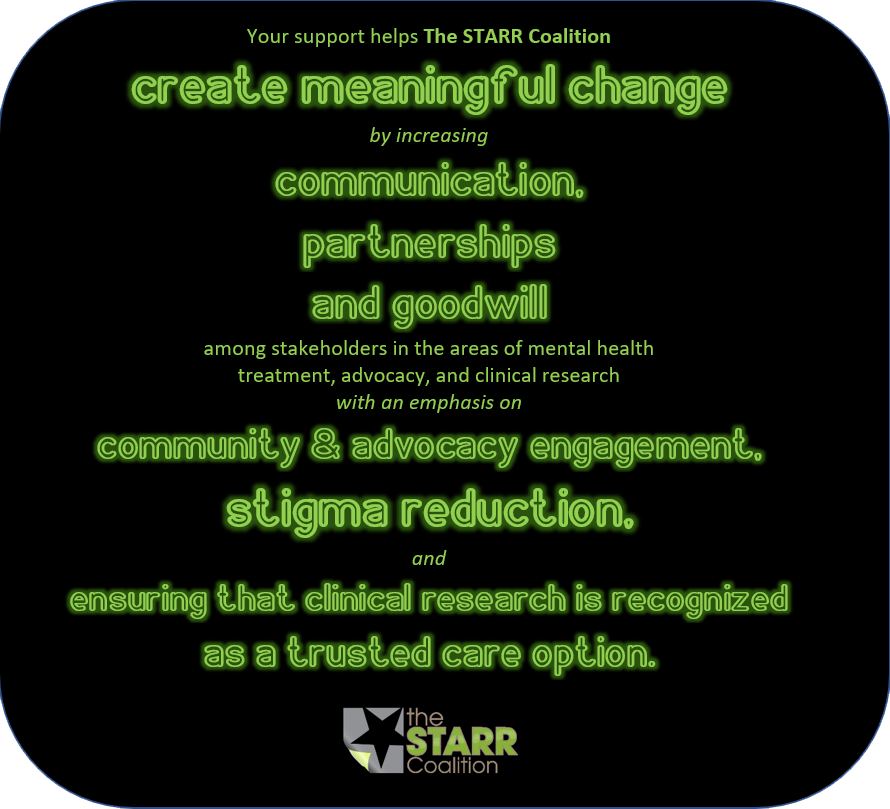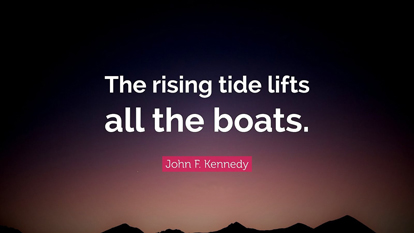The STARR Coalition exists to create meaningful change by increasing COMMUNICATION, PARTNERSHIPS and GOODWILL among stakeholders in the areas of mental health treatment, advocacy, and clinical research, with an emphasis on promoting clinical research sites as a valued part of the community and trusted care option.
Your tax-deductible donation will help us continue to do this important work and is sincerely appreciated!
The STARR Coalition is a 501(c)(3) nonprofit organization, our Tax ID # is 47-4634007.
We are happy to provide a form W9 and receipt upon request.
Thank you for your support!

Your donation will help The STARR Coalition continue to establish and champion important programs like these:
STARR 911:
Suicide completion rates have surged to a 30-year high. In the US alone, over 121 individuals complete suicide on a daily basis, with many more going unreported. STARR 911 is a simple process that, when implemented at sites and call centers, will save lives.
Given resources, the STARR 911 program could be marketed and distributed far more broadly throughout the industry, saving lives, and reinforcing the perception that research patients’ lives and safety are always prioritized.
Project RockSTARR:
Building relationships between those volunteering to participate in clinical research trials, local advocacy organizations, and clinical research sites is beneficial to all of those involved and offers both immediate and long-term returns. With Project RockSTARR, Sponsors set the donation amount; screened study participants select the advocacy group for the donation; the research site staff deliver the checks to local advocates. Win-win-win.
With additional resources directed to Project RockSTARR, each activated site would receive more specialized training, along with expanded community and advocacy development. Each site advocacy page would be expanded upon to include other resources beyond the local NAMI, MHA, and DBSA chapters, with sites’ input on the local nonprofits with which they work. This would drive improved success and greater advocacy support, which would strengthen the relationships between the research sites and the community, building trust, and ensuring that clinical research is recognized as a trusted care option with the community and beyond.
STARR Site Certification:
We’re working on building the STARR Site Certification program to include new modules including the diversity pledge, a trauma-informed care training module, and increased community and patient advocacy engagement.
National Call to Action to Support Mental Health Research:
The goal of the Call to Action is two-fold: (1) to inform the public of the need to support research for new treatment options for mental illness; and (2) to provide simple, actionable ways individuals and organizations can support mental health research. This initiative needs a dedicated team member to spearhead it, raising awareness of the need to support mental health research, driving participation, and generating renewed momentum to support this Call to Action.
Empathy Training via the STARR Auditory Hallucination Simulation:
The Auditory Hallucination Simulation (AHS) is a powerful exercise that simulates what it is like to have auditory hallucinations. It was created to help promote understanding and empathy for those experiencing mental health disorders. Additional resources would allow us to hire a staff person who would be responsible for getting the AHS into more mental health training programs, university psychology and behavioral health programs, as well as into the hands of providers of mental health services, police departments, family members, friends, peers and communities, providing a greater understanding of the complexities of living with schizophrenia.
Community Engagement:
Successful community engagement will raise a site’s profile within the community and educate the public on the benefits of clinical research. Sites that are engaging with the community and building trusting relationships within local non-profit organizations and advocacy chapters are likely to have better relationships with the patients, higher staff morale and job satisfaction, lower staff turn-over, and overall, more successful trials. That’s why The STARR Coalition puts resources into helping sites identify community resources and provide tools to engage with the community.
Workgroups:
Advocacy Board: The board meets monthly to discuss topics on advocating for individuals living with mental illness and research. We are continuing to add new members to our Advocacy Board. Objectives of the STARR Advocacy Board include (1) creating resources for STARR advocacy partners to connect with the mental health clinical research community, and be supportive of and advocate for research within their organizations; (2) providing a platform for the STARR community to connect with our advocacy partners.
Study Volunteer Transition Workgroup: This newly-formed workgroup is tasked with finding useful ways to aid study participants in their transition from the trial back to everyday life, ensuring that they continue their recovery journey. We are in the early stages of this workgroup and have been collecting insight from peer support groups, day treatment groups, and research sites on the benefits of including aftercare for individuals participating in and exiting clinical trials. We began this group after seeing the large gap in participant care following a study and ultimately will include elements in the STARR Site Certification.
Diversity Workgroup: The focus of this group is to ensure progress in research and the mental health workplace by collaborating with other professions to instill diversity, equity, and inclusion practices. The workgroup meets bimonthly to build DEI resources, best practices guidelines, and tools for the STARR community. Objectives include educating diverse communities on clinical research and building trust within communities on the safety and efficacy around clinical research.
Staffing Workgroup: A newly-emerging workgroup that is looking at developing staffing resources for clinical research sites.

